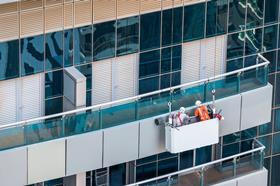Government research shows remedial plans for dozens of buildings ‘remain unclear’

New figures show 437 high-rise residential and publicly-owned buildings in England still have aluminium composite material cladding which is unlikely to meet existing building regulations guidance.
The latest official data on ACM-clad buildings showed as of 31 December 2018 268 unremediated towers were in the private sector, with 160 comprising social housing and nine being publicly-owned, such as hospitals and schools.
The housing department began compiling figures on buildings over 18m tall with ACM in the wake of the Grenfell Tower fire in June 2017 in which 72 residents lost their lives.
The government has said it will consider in a matter of weeks the recommendations of the Hackitt Review, which was prompted by the disaster in west London. Proposals include tougher regulations and enforcement, improving accountability among developers and owners and establishing a joint competent authority to oversee the safety of tall residential buildings during their lifecycle.
Of the 268 private sector buildings, plans for remediation on 56 remained “unclear”, according to the government update, down from “more than 200” in June last year.
Work had been completed on 30 private sector buildings, 18 had seen work start, plans existed for 126, and owners of 38 buildings said they intended to do work and were developing plans.
Communities secretary James Brokenshire said while the government was funding the replacement of ACM cladding in the social sector building owners and developers in the private sector must pay for the replacement of dangerous material themselves.
Brokenshire said the costs must not be passed on to leaseholders. “My message is clear. Private building owners must pay for this work now or they will pay more later.”
Of the 176 private residential buildings covered by the latest findings the government said the owners or developers of 80 had either agreed to fund the cost of remediation or had had warranties accepted in order to pay for the work to be done, while it was unclear who would fund work on the remaining 90.
Of the 160 social sector buildings 37 had finished remediation work, 81 had started work, 40 had a plan in place but work had yet to commence, while owners of two further buildings had indicated their intent to do work.
There were three local authorities with more than 20 buildings which still feature an unsafe cladding system which had yet to be fixed, the government said: Salford in Greater Manchester and Greenwich and Tower Hamlets in London.


























No comments yet